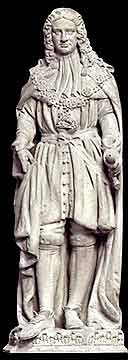George II (b.1683 r.1727-1760)
© 2007
Armchair Travel Co. Ltd. - This page may be used for non-commercial purposes
ONLY!
![]()

[ Play
Narrated and Animated Movie ! ] He had the haughtiness of Henry VIII without his spirit; the indignities of Charles I without his bigotry for prerogative; the vexation of King William III with as little skill in the management of parties; and the gross gallantry of his father, without his good nature or his honesty.
George II was the son of George I, and so became the second Hanoverian king of Britain. He was a tall man, with brilliant blue eyes and a large nose. He was seen as vain, arrogant, ungracious, obstinate and selfish by his contemporaries who were highly critical of his character. He had few intellectual interests apart from a wavering fondness for history and military memorabilia. His only distinctive credits were his military capabilities and his interest in music - in fact George patronised Handel whom he much admired.
For the first twelve years of his reign George relied heavily on his prime minister Robert Walpole, who kept Britain out of all major foreign disruptions. But from 1739 onwards, Britain became entangled in almost continuous conflict in Europe. This began firstly with Spain over a quarrel, then with France in the War of the Austrian Succession, then again with France during the Seven Years War. During these wars George proved his status as a courageous leader. At the Battle of Dettingen in 1743 George led his troops into action - this was the last time a British king led an army into battle.
As a result of such warfare, this period saw a substantial extension to the British Empire in India, North America and Canada. Britain was steadily becoming one of the world's major powers.
He looked upon all men and women as creatures he might kick or kiss for his diversion.
He was thought to reward his mistresses by giving them sweepstakes tickets.
George the First was always reckoned
[ Virtual
Tour ] [ Main Topics
Index ]
- Horace Walpole, Memoirs.
Additional Information on
George II (b.1683 r.1727-1760)
QUOTATIONS
- Lady Mary Wortley Montagu.
- T.H. White, The Age of Scandal, 1950.
Vile, but viler George the Second;
And what mortal ever heard
Any good of George the Third?
When from earth the Fourth descended,
God be praised, the Georges ended.
- Walter Savage Landor, 1775-1864.
Explore-Parliament.net: Advanced Category Search
Keyword Categories:
_Object_Sculpture
_Object_Artwork
_Object_Portrait
_Artist_Thames_Bank_Workshop
_King
_Royal_Family
_Man
_Person
_George_II_